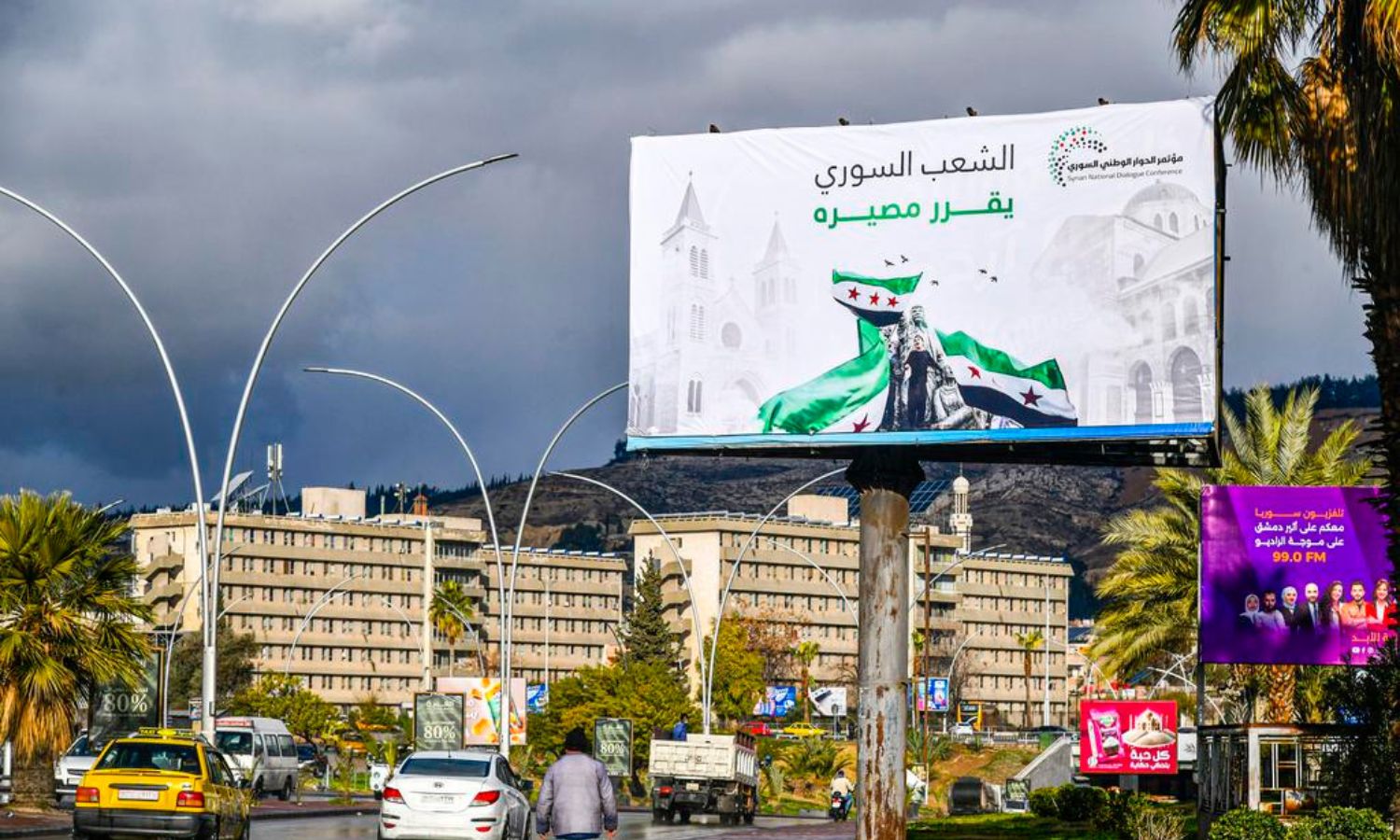



Jana al-Issa – Hassan Ibrahim
On Monday, February 24, the first activities of the National Dialogue Conference began, with an agenda deemed by politicians and activists as unsuitable for the magnitude of the entitlement necessary for Syria.
Criticism has targeted the conference’s agenda, which will begin on Monday with an introduction session and dinner for attendees, while discussions on the agenda will start on the following day within six groups and workshops on general topics.
The conference will discuss six issues in different sessions: transitional justice, constitutional building, reform and establishment of institutions, personal freedoms and human life issues, in addition to the role of civil society organizations, and economic principles.
The late delivery of invitations less than 48 hours before the conference sparked controversy in the Syrian street, leading some invitees to apologize for not attending. The one-day time frame for discussing the agenda has also faced criticism, as many believe that such discussions require far more time than allocated, raising doubts about the results the conference may yield.
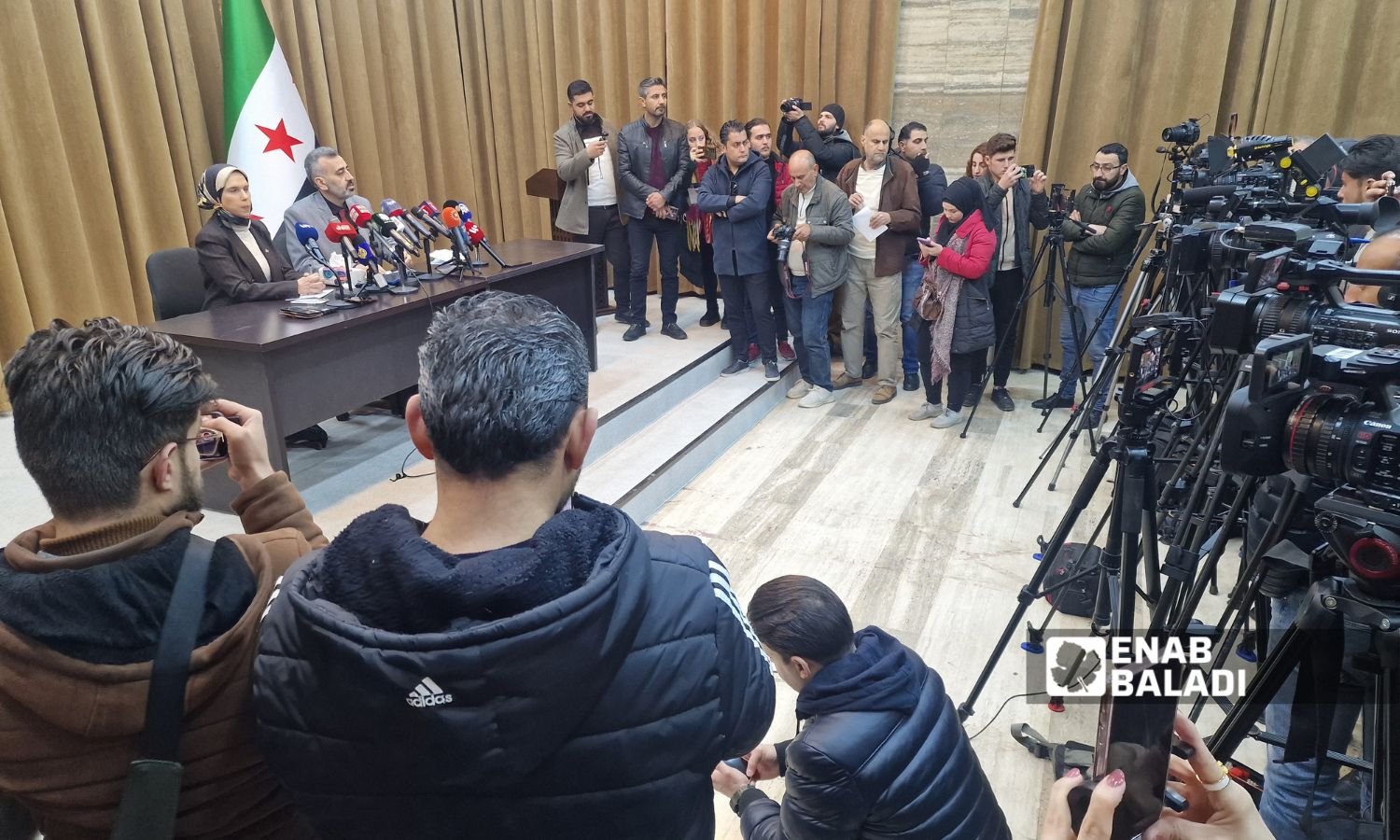
The preparatory committee for the Syrian National Dialogue holds its second press conference – February 23, 2025 (Enab Baladi/Anas al-Khouli)
About a week before the conference, the preparatory committee held sessions in most Syrian provinces and with representatives from the eastern region in the capital, Damascus.
These sessions were not without criticism, starting with the invitation mechanism and ending with the management style of the dialogue during the sessions. Despite the organizers announcing a clear agenda, compliance was lacking in many sessions, allowing the attendees to manage the discussions entirely, resulting in chaos and diminishing the importance of some topics at the expense of others, according to a survey conducted by Enab Baladi among attendees from various provinces.
Lawyer Zahabiya al-Jabr attended the preparatory committee session in the governorate of As-Suwayda and told Enab Baladi that she received the invitation personally through the secretary of the governorate, without having full knowledge of the criteria used for selecting invitees.
Al-Jabr emphasized that any invitation should have been based on criteria, as some invitees contributed nothing, while others who might have been helpful were not invited.
Regarding the session’s agenda, she expressed a desire for a genuine dialogue, which did not occur due to the limited duration and the numerous topics raised that could not be addressed in that time.
Al-Jabr also noted the exclusion of trade unions from invitations, stating their attendance was crucial given their structured nature and direct involvement in matters like transitional courts and the constitutional declaration.
She believed the committee’s work was purely technical, with many discussion topics and little time, indicating that some participants submitted working papers reviewed by the committee but were never discussed, and the committee did not come up with final recommendations to be agreed upon during the conference.
Lawyer Suleiman al-Qarfan, who attended the session in the governorate of Daraa, also received the invitation personally through the committee, clarifying that the rest of the invitations in Daraa came from local actors and councils, and advisory councils for each town or city that nominated names as representatives for these areas.
Regarding the committee’s work, al-Qarfan explained to Enab Baladi that it informed attendees about the meetings held in various provinces and that it reached a conclusion that the demands of Syrians regarding the National Dialogue Conference revolved around six main themes:
Al-Qarfan remarked that professional unions and Syrian civil society organizations should have been included, as their participation could have positively impacted the proposals and ideas, especially due to their awareness of similar international experiences.
Political activist, Radwan al-Atrash, who was present at the session in the governorate of Idlib, stated to Enab Baladi that he received the invitation directly from the political administration, clarifying that the nature of attendees invited was comprised of activists who have a history in political work during the revolution years.
Al-Atrash considered this invitation mechanism minimally acceptable but insisted it should have been broader to include diverse social groups.
He confirmed that the committee set the agenda with six topics that were not adhered to, as discussions shifted to more casual exchanges due to attendees straying from the main topics to address political, service, and administrative issues instead.
The political activist emphasized the need for a portion of the attendees to be technocrats and more specialized in the national conference, in addition to involving all components of the Syrian population.
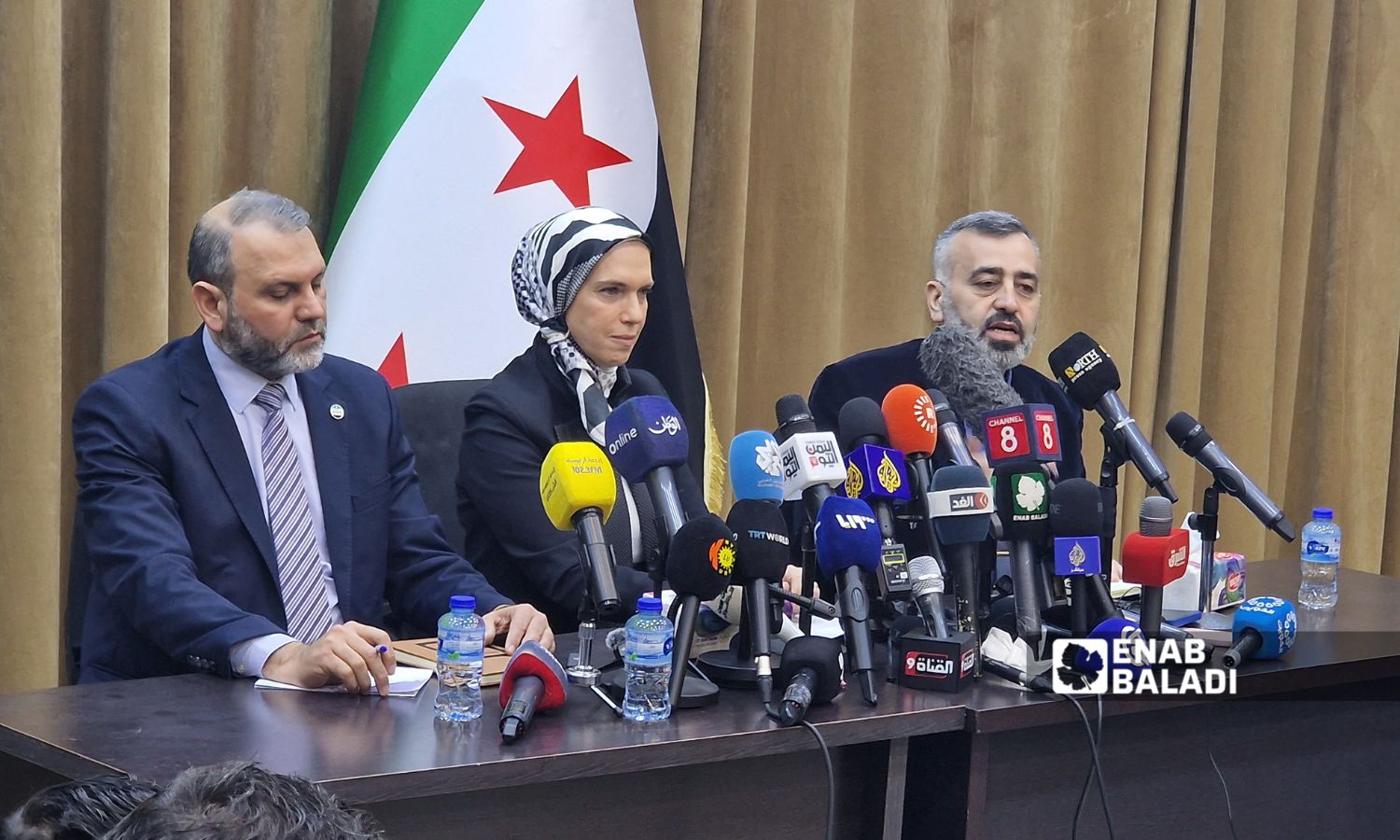
The preparatory committee for the national conference holds a press conference in Damascus – February 13, 2025 (Enab Baladi/Anas al-Khouli)
In response to criticisms regarding these sessions, the preparatory committee stated in a press release on February 21 that the listening and dialogue sessions being organized with the participation of various personalities and volunteer teams aim to involve citizens in discussing the paths of the national dialogue.
The committee clarified that these sessions were directed by volunteers and are open to everyone, sometimes organized according to segments and specialties.
Hassan al-Daghim, spokesperson for the preparatory committee, stated in a conference attended by Enab Baladi on February 23, that the recommendations from the National Dialogue Conference will not be mere suggestions or formalities but will serve as a foundation for the constitutional declaration, economic identity, and institutional reform plan. He highlighted that more than 30 meetings have been held across all provinces, involving approximately 4,000 men and women from various components of society.
According to the committee, there has been a repeated call for the issuance of a temporary constitutional declaration to facilitate the transitional phase and to develop an economic plan compatible with this phase, to restructure government sectors and involve Syrians in managing institutions, and to enhance security and stability to facilitate the rebuilding of state institutions.
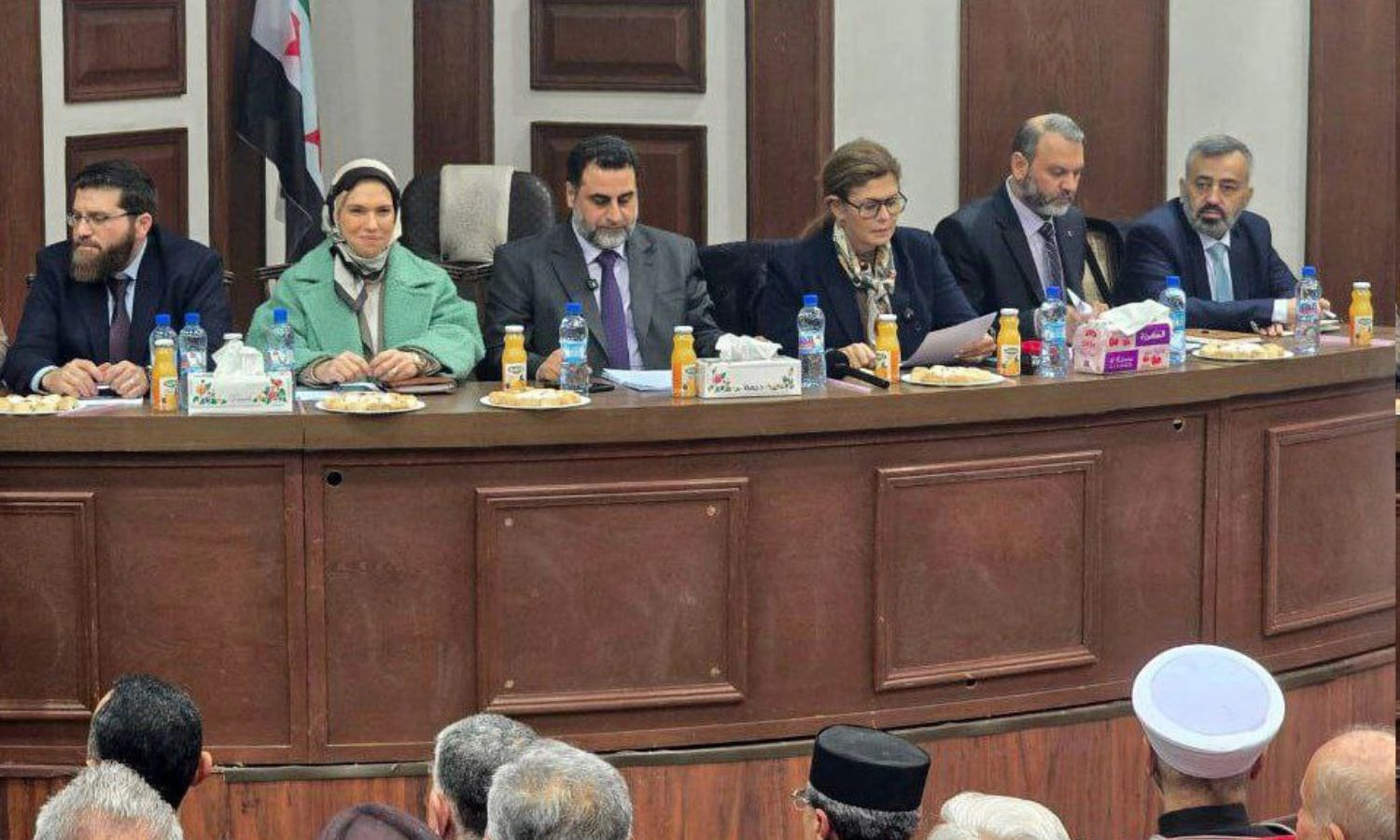
From the dialogue session with the preparatory committee of the Syrian National Dialogue Conference in As-Suwayda governorate – February 19, 2025 (SANA)
The invitations that the committee began distributing on Sunday, February 23, came as a surprise in terms of the timing of the conference, which did not provide invitees enough time to arrange their attendance, especially those residing on other continents, which would require them considerable arrangements to attend.
Journalist Akil Hussein, one of the invitees, noted that the number of invitees to the Syrian National Dialogue Conference totaled 550 persons, with 533 confirming attendance (97%), while 17 persons (3%) stated they would be unable to attend.
National dialogue is seen as a popular tool for resolving conflicts and political transitions in a country, capable of expanding discussions regarding a nation’s paths beyond the usual elite decision-makers and serving as a mechanism to break political stalemates and transform complex conflicts, according to the United States Institute of Peace (USIP).
Before genuine national dialogue can commence, a comprehensive, transparent, and consultative preparatory phase must lay the groundwork and establish initial decisions regarding the structure and format of the dialogue, particularly concerning who is invited to participate.
The committee has not specified the location for the conference scheduled for February 25, but attached the invitation with the following notes:
Following the preparatory committee’s announcement of sending invitations for the conference, there was a divide on social media amid welcoming and support for the conference, alongside criticisms regarding the short notice and the selection process of attendees. Critics argue that the situation lacks seriousness in dealing with such an extraordinary event in Syria’s history.
These invitations contradict what al-Daghim stated on February 13, saying, “When the process of communication matures and the preliminary papers for implementation are prepared, there is no doubt that an invitation will be made for the National Dialogue Conference, where Syrians will find the ground on which they will launch to build their country’s future for the first time since 1950.”
According to Enab Baladi’s monitoring, several figures have declined the invitation to the National Dialogue Conference due to time constraints. These include politician and former Syrian National Coalition member George Sabra, who has been living in Paris for some time, and Qutaiba Idlbi, the Director of the Syrian Project at the Atlantic Council (an American research institution), who stated that arranging travel and attendance within this tight timeframe was impossible.
Political analyst and journalist Marah Bukai also declined the invitation, as she was exploring ways to reach on time, but found that the first and fastest flight from Washington would land on the evening of the second and final day of the conference.
Syria’s constitutional law professor, Sam Dalla, apologized for not attending, noting he received the invitation after midnight (February 23) for the conference, deeming it impossible to reach Damascus in time. He considered the timing and method of sending the invitation as not serious in handling such a national entitlement.
Former spokesperson for the Syrian Foreign Ministry, Jihad Makdissi, also expressed his inability to reach quickly from Washington to Damascus, citing other lesser commitments that he could not overlook without prior arrangement.

A preparatory session for the National Dialogue Conference in Deir Ezzor attended by tribal leaders and representatives from the province – February 21, 2025 (Enab Baladi/Obadah al-Sheikh)
Syrian doctor and humanitarian activist, and former aid and advocacy worker, Mohamad Katoub criticized the handling of the National Dialogue Conference on Facebook. He stated that what is happening is disgraceful towards the country and the Syrians, especially after 14 years of sacrifices and 54 years of suffering under tyranny. He emphasized that Syria deserves better.
Syrian rights activist and Director of the Syria Justice and Accountability Center (SJAC), Mohammad al-Abdallah, remarked on Facebook that the credibility of the entire National Dialogue process is in question due to the narrow timeframe in which invitations were sent to participants across provinces. He described sending invitations to hold a conference without adequate preparation, without specifying the conference location, and sending invitations to Syrian figures outside Syria just two days before the dialogue as a “scandal.”
He mentioned that this hindered their participation, causing genuine disappointment in the public sphere and reinforced the idea that the National Dialogue Conference has turned into mere “lip service”—a necessary step regardless of its credibility, importance, or the need to succeed, as it would provide a political cover for the authority today.
Al-Abdallah pointed out there are pending and complex issues in Syria, including the new administration’s relationship with both the Syrian Democratic Forces (SDF) and the Druze community in As-Suwayda, as well as the views of Salafi jihadist circles towards Ahmed al-Sharaa, who has become the civilian governor of Syria.
He believes it is possible to save the National Dialogue before the conference takes place and transform it into a general national conference that results in binding recommendations and the formation of a legislative body to draft a temporary constitutional declaration for the country. He noted that successfully conducting the conference would close this chapter to some extent, allowing political activity in the country to commence, and providing an excellent image for the transitional phase to the international community.
He argued that the success of the National Dialogue and internal Syrian negotiations among all parties is the only formula that would allow Syrians a chance for a swift recovery. Without that, Syria would enter a phase of stagnation, extending the transitional phase in which the government would lose popularity, Syrians would waste time and participation in saving their country, and Syria would miss a timely opportunity for reasonable recovery.
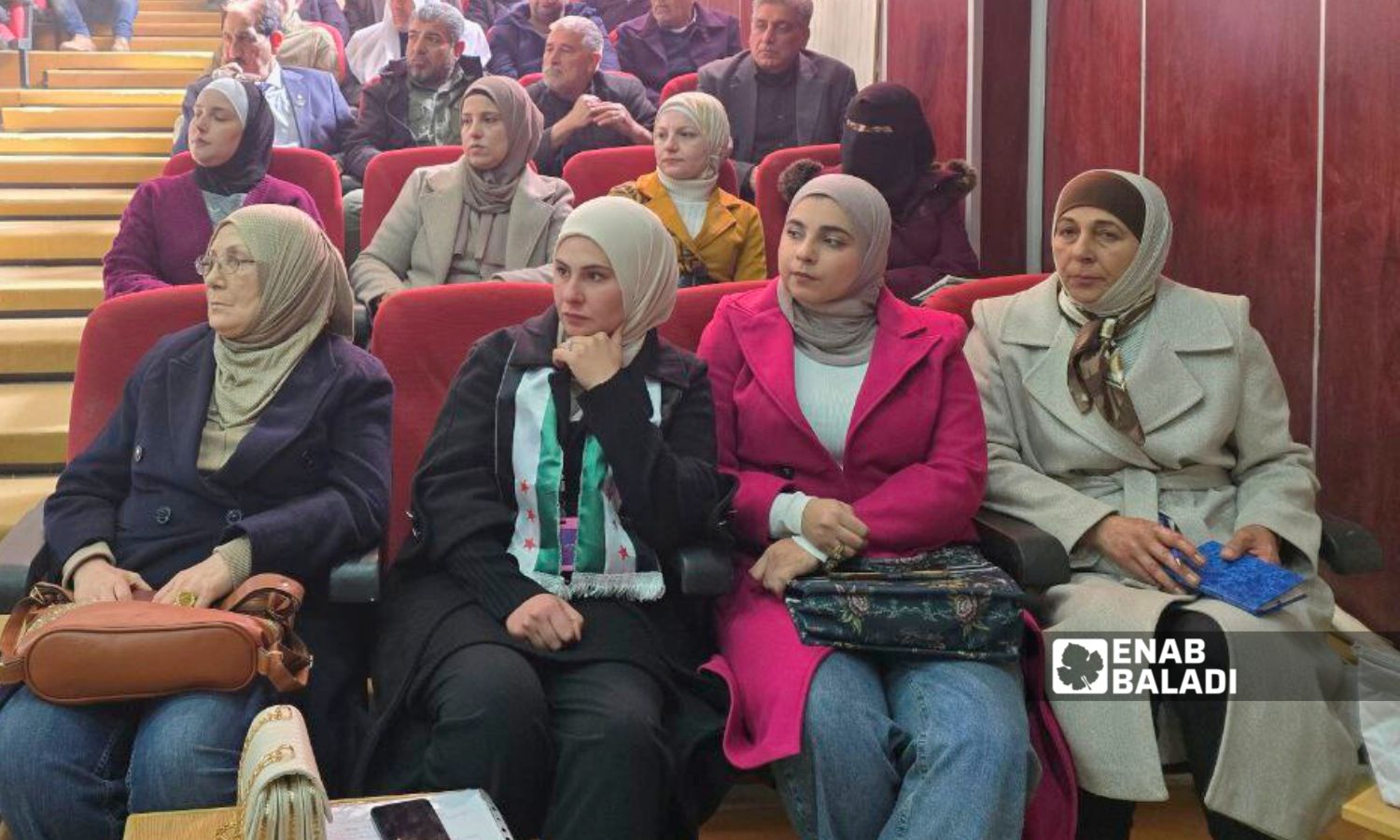
Women from Deir Ezzor representing their province in the preparatory session for the National Dialogue Conference – February 21, 2025 (Enab Baladi/Obadah al-Sheikh)
The spokesperson for the preparatory committee, Hassan al-Daghim, asserted that the recommendations issued by the committee are not nominal but rather awaited recommendations. He indicated that the decisions of the National Dialogue Conference would not start from scratch; rather, they would culminate from preceding meetings and discussions between the public delegations and the Presidency and what civil society organizations have held among Syrians in various provinces, in addition to the Victory Conference and the decisions that emanated from it on the security of citizens and the safety of the nation.
He added that the conference is part of a whole and will serve as a culmination of previous efforts; thus, its recommendations are awaited by the Syrian Presidency, which will rely on them for the forthcoming constitutional declaration or constitutional building and what pertains to the social contract and economic vision.
Huda al-Atassi, a member of the preparatory committee, stated during the conference that dialogue is not just a conference or a phased event but a sustainable approach to resolving national issues progressively and responsibly. She added that the conference will have a practical character, with specialized workshops to address the issues the committee gathered from its meetings.
She affirmed that this conference is the first step in a long national journey that requires continuous collective work to build a new Syrian national identity that preserves civil peace and fulfills the aspirations of the Syrian people for a future worthy of their sacrifices.
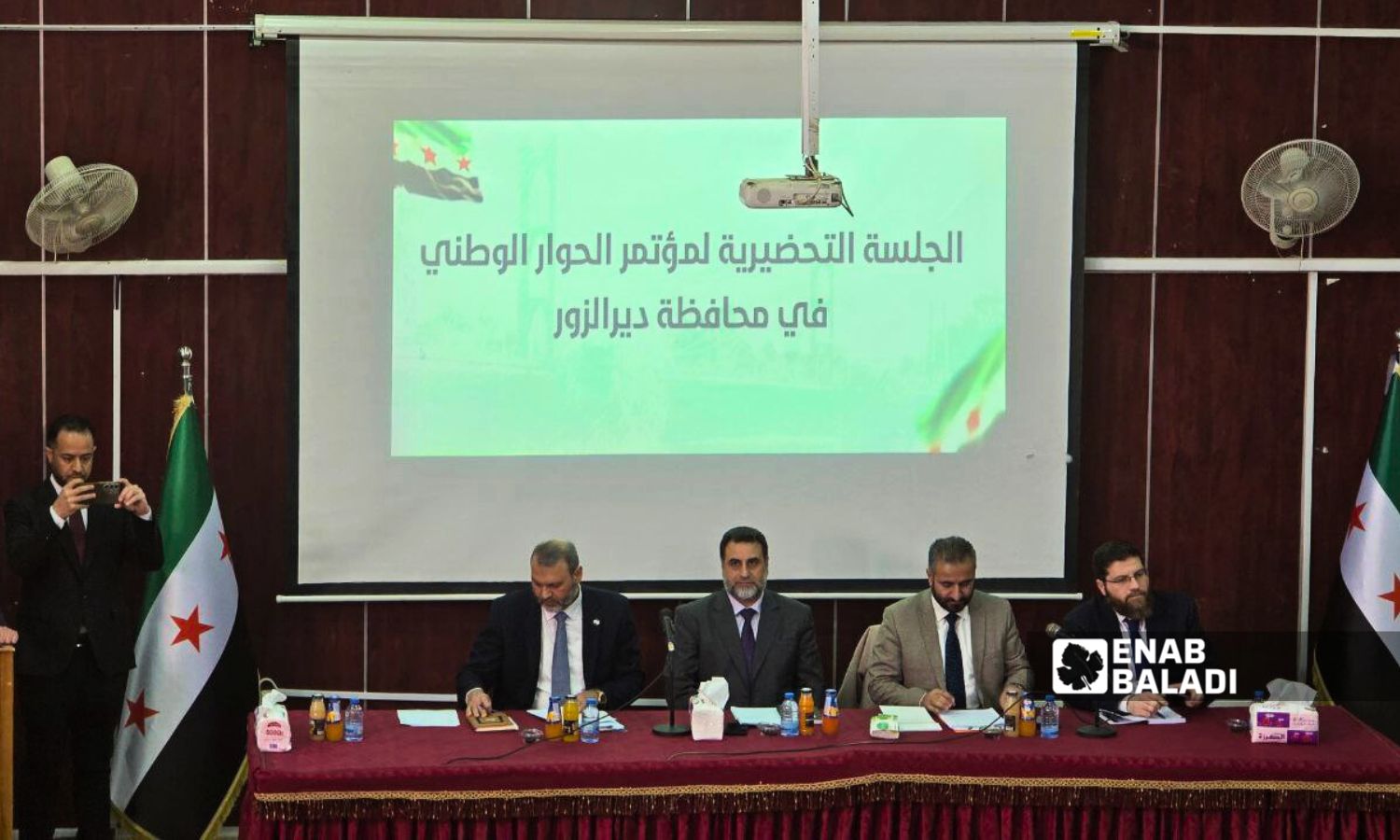
Members of the National Dialogue Conference committee during the management of a preparatory session for the National Dialogue Conference in Deir Ezzor – February 21, 2025 (Enab Baladi/Obadah al-Sheikh)
if you think the article contain wrong information or you have additional details Send Correction